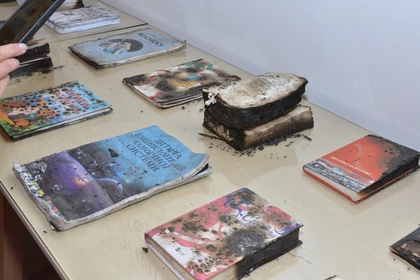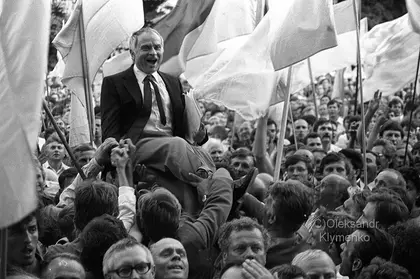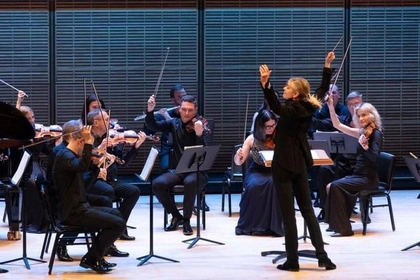A legend in his lifetime, controversial, outspoken, courageous, cunning, and patriotic, one of the last of the Mohicans of Ukrainian literature of the 60s, Dmytro Pavlychko, passed away on Jan. 29 at the age of 94.
I had the privilege of knowing this remarkable poet, translator, political activist and public figure, winning his confidence, and interviewing him on several occasions. And so, I want to say a few words in the form of a tribute and farewell.
JOIN US ON TELEGRAM
Follow our coverage of the war on the @Kyivpost_official.
It's hard to write about a man who became a legend in his own lifetime and in his later years a friend of mine. Not only to convey in a short article the drama of his life and the contribution he made, but to capture the essence of this creative dynamo, courageous poet, patriot and dissenter – even when he was forced to play the role of a conformist in Soviet times – and who eventually became one of the authors of Ukraine’s independence.
 Dmutro Pavlychko with the author in December 2019 before recording a radio interview. Photo from Bohdan Nahaylo's archive.
Dmutro Pavlychko with the author in December 2019 before recording a radio interview. Photo from Bohdan Nahaylo's archive.
So here are a few brushstrokes to add to the fuller portrait that will be prepared by many others.
When I moved to Kyiv in 2014 and lived in the very center, he was a neighbor of mine. He was based in the very epicenter of Ukraine’s most recent history, having an apartment on Khreshchatyk 13, next to the Maidan where the Orange Revolution of 2004-05 and Revolution of Dignity of late 2013-early 2014 took place. It was a fitting place for someone who was not only a witness of Ukraine’s tough modern history, but who helped shape it.

Portrait of a Book Fair in War Time
When we got to know one another, I used to bump into Pavlychko quite frequently in the downtown area. If not in blue jeans and a jean jacket, the young nonagenarian, rushing from one public engagement to another, would be smartly dressed in flash shirts and ties.
There was a touch of class about this cultural and civic luminary. To those he trusted, he exuded warmth and sincerity. He was always energetic, wanting to stop and talk, and so full of ideas and reminiscences.
Pavlychko was a gifted and prolific poet, who like his contemporaries Ivan Drach and others chose, from the 1960s onwards, not to fight the Soviet system openly but to work within it.
While some defied and confronted it, and paid the price by ending up in labor camps and psychiatric hospitals, through their poems, translations and film scripts, he, Drach and those like them helped Ukrainian culture to withstand the pressure and develop within the constraints prescribed by Moscow.
Pavlychko is probably best known as the author in 1964 of the words to the modern Ukrainian classic – the song “Dva koliory,” or Two Colors. It got him into hot water with the Soviet authorities who immediately saw it as implicitly promoting “Ukrainian nationalism.”
In fact, Pavlychko published over a dozen collections of poems, translated some of the most celebrated poets from around the world, wrote film scripts and was a literary critic. In 1964 he wrote the daring screenplay to the Film “Son” (Dream) about the life of Ukraine’s national poet Taras Shevchenko (1814-61). As editor of the monthly journal Vsesvit (Universe) from 1971 to 1978, he published some of the best of foreign literature in Ukrainian. He was also instrumental in getting the collected works of Shakespeare to appear in his native language.
Pavlychko himself translated a remarkable variety of foreign poets and authors into Ukrainian ranging from Shakespeare (Sonnets) to Baudelaire and Jose Marti.
But it was not all plain sailing. As emerged after the end of Soviet rule, as a young boy, Pavlychko had been imprisoned in the late 1940s on suspicion that he was involved with the Ukrainian anti-Soviet resistance in Western Ukraine.
And in 1957-58 his bold collection of poetry entitled “Pravda klyche” (The Truth Calls) was confiscated and banned because it was considered too politically candid in its treatment of the Stalin era. As a proto-dissident, who was made to realize that the post-Stalin system would still treat its critics harshly, he learnt to be more cautious and wilier.
When in the second half of the 1980s Soviet leader Mikhail Gorbachev began relaxing political controls, Pavlychko was among the outspoken writers defending the Ukrainian language. In 1987 he openly warned the authorities that unless the official policy towards the USSR’s non-Russian nations was changed there would soon be no “friendship” of its peoples left.
 Dmytro Pavlychko (left) with notable Ukrainian literary scholars at a conference at the University of Illinois at Urbana-Champaign in the early 1990s. To his right, George G. Grabowicz, Vitaliy Donchyk and Yaroslav Rozumny.
Dmytro Pavlychko (left) with notable Ukrainian literary scholars at a conference at the University of Illinois at Urbana-Champaign in the early 1990s. To his right, George G. Grabowicz, Vitaliy Donchyk and Yaroslav Rozumny.
He, Drach, Volodymyr Yavorivsky, and other writers and literary scholars, all still Communist Party members at the time, welcomed the freeing from Soviet labor camps of political prisoners and did not hesitate to create an alliance with them in the cause of democratization and loosening of Moscow’s control over Ukraine.
In 1989 Pavlychko was elected head of the first major Ukrainian patriotic organization to emerge at that time – the Taras Shevchenko Ukrainian Language Society. He also became one of the leaders of the Popular Movement for Restructuring, known as Rukh (Movement), which became the main vehicle for promoting democracy and national self-determination. Impassioned and a fiery orator, the poet was finally in his element.
Pavlychko spoke several languages and had a basic command of English. When the British historian Norman Stone arrived in Kyiv in the summer of 1991 with a BBC TV crew it was still hard to find prominent Ukrainians who knew English. I advised him to interview the poet and political leader. The interview was filmed in front of the Opera House.

Dmytro Pavlychko being interviewed by Norman Stone for the BBC in the summer of 1991. From the archive of Bohdan Nahaylo
Eventually, when after the failure of the attempted putsch by communist hardliners in Moscow in August 1991, Pavlychko, by now elected a deputy to the then still Soviet Ukrainian parliament with its communist majority, became one of the authors of the declaration of Ukraine’s independence adopted on Aug. 24.
After independence was achieved Pavlychko remained active in politics as a lawmaker and eventually also assumed diplomatic posts. He was Ukraine’s ambassador to Slovakia from 1995 to 1998, and to Poland from 1999 to 2002. It was thanks to his efforts that a statue of Taras Shevchenko was erected in Warsaw.
There was a very tragic moment in Pavlychko’s life when on the very eve of the Millennium, Dec. 31, 1999, his very talented daughter Solomiya died tragically. A literary scholar she had, among other things, translated D.H. Lawrence’s “Lady Chatterley’s Lover” into English.
Indefatigable Pavlychko remained active in public life right to the end. I last interviewed him for my radio program at the end of 2019, and he was still in fine form.
He seemed to want to concentrate on the early part of his life, as if to set the record straight as to his formation, instilled patriotism, and chosen strategy in life.
The poet had one big dream that he did not realize before his death. He was passionate about the idea of putting up a statue in Kyiv of the Western Ukrainian poet, writer and political activist Ivan Franko (1856- 1916). The prolific titan was an important source of inspiration for Pavlychko – perhaps his role model.
“Bohdan”, he’d say, “we still have statues of any number of Russian or Soviet ‘idols’ in our capital, but not one of our greatest literary and political figures. How long can this be?”
 Dmytro Pavlychko says farewell to his his colleague, fellow-poet and political activist Ivan Drach at his funeral in June 2018.
Dmytro Pavlychko says farewell to his his colleague, fellow-poet and political activist Ivan Drach at his funeral in June 2018.
In short then, Pavlychko was a giant in his own way and the embodiment of virtually a century of Ukraine’s difficult history of resilience and vitality despite all the odds.
As in his famous song, he viewed the world not in terms of black and white, but red and black – red signifying love, and black signifying sorrow.
You can also highlight the text and press Ctrl + Enter






